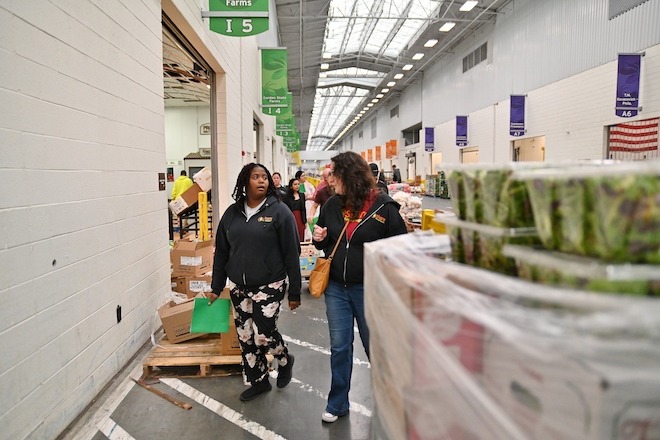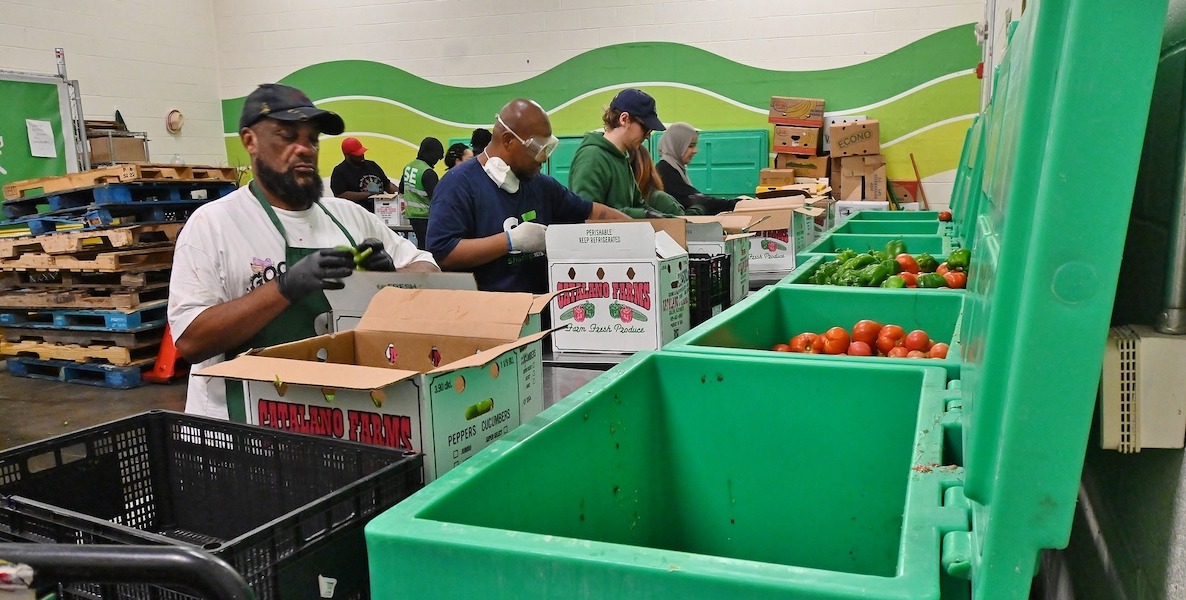In the heart of Philadelphia, a quiet revolution is happening. Local food businesses are transforming surplus food — once destined for the landfill — into lifelines for families across the city. From fall 2023 through spring of this year, Philly Food Rescue saved the equivalent of 2,879 meals through donations from food businesses as part of the Sustainable Business Network’s (SBN) recent Food Saver Challenge. These meals provided enough food to nourish over 700 families of four in Philadelphia.
Suzannah Hartzell, Director of Philly Food Rescue for the Share Food Program, has seen firsthand the impact of this work. “We were thrilled to work with Mariposa and Philadelphia Catering, finding homes for surplus food with people, where it belongs!” she shared. “Philly Food Rescue routes food to hundreds of local community partners, so donations stay within neighborhoods, businesses reach their zero waste goals, and families get better access to fresh, nutrient-dense food. Everybody wins.”
Philadelphia’s food waste problem is staggering. Nearly 20 percent of our waste stream is food waste, while almost a quarter of Philadelphians face food insecurity — 10 percent more than the national average. This contrast between excess food and the growing need for food reveals a critical opportunity for the City to rethink how we handle surplus food.
Black Philadelphians are disproportionately affected, with over 28 percent facing food insecurity 2022. Many local businesses, especially those owned by BIPOC entrepreneurs, are stepping up to fight food waste and feed their communities. These trusted neighborhood pillars are already doing important work, but without greater city support, their efforts can’t scale to meet the challenge.
SBN’s Food Saver Challenge showcases how local businesses can be integral to addressing food waste and insecurity. The Challenge, funded through the NRDC Food Matters Initiative, supported nine businesses from October 2023 to May 2024 in a competition-style campaign to execute innovative solutions to reduce food waste. Participating businesses worked alongside community organizations like Sharing Excess to donate 5,856 pounds of food — valued at $82,867 — and divert 79,043 pounds of organic waste. That’s equivalent to the weight of three school buses.

The success of SBN’s Food Saver Challenge reveals a powerful truth: Local businesses are motivated to be part of the solution. Participant LUHV Foods, for example, established a new community fridge and pantry. Another participant, Mariposa Food Co-op in West Philadelphia, donated 120 pounds of food through the Philly Food Rescue in the first week of the Challenge alone. But to sustain and scale these efforts, businesses need additional assistance. The Food Saver Challenge demonstrates that with the right support, scalable, citywide solutions are within reach.
Cities across the country offer inspiring models. Minneapolis’ Homegrown Minneapolis initiative, for example, integrates organic waste prevention strategies into the city’s Climate Equity Plan. Denver’s Food Matters program educates residents on the benefits of food redistribution and local food systems and has piloted a behavior change campaign. These programs show just how effective government-supported efforts can be.
Philadelphia’s ambitious goal to divert 90 percent of food waste from landfills by 2035 requires bold action. The key? Investing in food waste prevention. By funding community-driven food waste diversion and offering tax breaks to businesses that step up, initiatives like SBN’s Food Saver Challenge can thrive. Grants, low-interest loans, and citywide composting programs targeting waste prevention and redistribution can further empower businesses to cut waste. And with new funding from the Bipartisan Infrastructure Law, there’s no better time to reshape our city’s food system for good.
Reducing waste alone isn’t enough. Philadelphia must improve food access to truly combat food insecurity. Revitalizing The Food Trust’s Food Bucks programs (wherein shoppers paying with SNAP earn SNAP incentives for buying fresh produce) will give low-income families the fresh produce they need. City leaders can supercharge our food system by funding farmers and incentivizing partnerships between local producers, restaurants, and food retailers.
But we can’t stop there. The City can also consider investing in the infrastructure that makes healthy food accessible. Improving public transportation routes to farmers’ markets and grocery stores, along with expanding urban agriculture programs, will ensure that more Philadelphians can access nutritious food close to home. Together, these actions can help to build a resilient, localized, and community-powered food economy that leaves no one behind.
The City of Philadelphia is well-positioned to join other cities leading the way in food waste prevention. By integrating food waste reduction into its broader sustainability goals and providing tangible support to the businesses and organizations already doing the work, our city can drive meaningful change. SBN’s Food Saver Challenge has laid the groundwork — now it’s time for the City to build on this foundation and create a future where food insecurity and waste are no longer part of our landscape.
Devi Ramkissoon is the Executive Director of the Sustainable Business Network of Greater Philadelphia, a non-profit that empowers the business community to build profitable enterprises that serve community needs, share wealth, and protect the environment.
Jamie R. Gauthier represents West and Southwest Philadelphia as the City Councilmember for the Third District. Councilmember Gauthier fights for her constituents’ right to live with dignity and remain in the neighborhoods they’ve called home for decades.
The Citizen welcomes guest commentary from community members who represent that it is their own work and their own opinion based on true facts that they know firsthand.
![]() MORE ON ENDING FOOD WASTE AND INSECURITY FROM THE CITIZEN
MORE ON ENDING FOOD WASTE AND INSECURITY FROM THE CITIZEN



